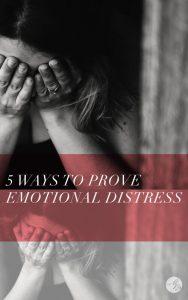
In addition to physical injuries, many people suffer emotional distress due to a collision or another type of accident. However, unlike physical injuries where broken bones and x-rays are concrete proof of harm, emotional distress can be difficult to prove. Working with a personal injury attorney can help because they know the evidence necessary to show emotional distress.
Consider these five ways to prove that you suffered emotional distress and have a right to recover compensation for it:
Keep a Journal
As soon as your injuries are stable, you should consider keeping a journal to document your experience. Your entries do not have to be anything grand or in-depth. You can simply include:
- Your pain levels
- Your symptoms
- Anything that indicates you are living with a reduced quality of life
For a free legal consultation, call 800-537-8185
Create a List of the Daily Impact Your Emotional Distress Causes
Creating a list of missed activities and how this made you feel could support your claim for emotional losses. In addition, some attorneys ask family members and friends to testify about their loved one’s missed activities and how this affected the entire family.
Ask Health Care Professionals to Testify
One of the most important ways to prove emotional distress is through testimony or other evidence from a doctor or health care professional. Your attorney can enlist help from an expert if needed.
Click to contact our personal injury lawyers today
Seek Counseling for Your Emotional Distress
Showing that you received treatment because of your emotional distress is strong evidence for your case. Getting help from a professional can help you overcome depression, anxiety, and other symptoms.
Keep Any Physical Evidence
If you received any prescriptions for mental health concerns during your treatment, keep a copy. These prescriptions can serve as physical evidence of your depression, anxiety, insomnia, or other stress and worry.
Factors Key in Recovering Damages for Emotional Distress
There are several other factors you will need to prove in addition to showing you suffered emotional distress. These include:
The Duration of Your Emotional Distress
The amount of time you suffered from emotional distress is important in proving your claim. You cannot make a claim for emotional distress if your worry only occurred during and immediately following your injuries. Fear or nervousness at the time of an accident or immediately after is one thing. Still, if you experience symptoms for some time after the accident, this may be emotional distress.
For example, if you are having trouble sleeping due to nightmares—or struggling with driving again because you are afraid to get behind the wheel—these are ongoing emotional concerns occurring due to your accident.
The Severity of Your Symptoms
The severity of your symptoms is also critical. If your emotional distress is manifesting itself through physical symptoms, this can help prove your claim. Physical signs of emotional distress may include chronic back pain, tension headaches, neck pain, gastrointestinal problems (including pain and diarrhea), and heart palpitations. Panic attacks are also common.
The Severity of Your Accident
The insurer will also consider the severity of the accident. For example, severe collisions are more likely to cause emotional distress than fender benders.
Who Is At Fault?
Who caused your injuries is an essential factor in recovering any damages in your case, including intangible losses such as emotional distress. You must prove the other party caused your incident and injuries. For example, rear drivers are usually at-fault in a rear-end collision. If another driver hit you from behind, they are likely legally responsible for your damages.
Mental anguish resulting from something other than the accident you are trying to recover from will not be considered when calculating a recovery. The distress and the accident must be clearly linked.
Working with an Attorney to Recover Emotional Distress Damages
Victims of personal injuries may be able to seek and recover emotional distress damages as a part of their insurance claim or lawsuit. These damages are non-economic, and your attorney will include them with similar losses, such as your physical pain and suffering.
A lawsuit may be necessary if the insurance company does not want to include emotional distress in your compensation. In the Gulf South, deadlines for suing vary from one year in Louisiana (La. Civ. Code Art. 3492) to three years in Mississippi (Miss. Code Ann. § 15-1-49) and Arkansas (Ark. Code Ann. § 16-56-105). Alabama gives you two years (Ala. Code § 6-2-38).
Circumstances could shorten these timelines further, so you want to act quickly. Our attorneys are ready to discuss your case today.
Morris Bart, LLC Offers Free Initial Consultations
Besides physical injuries suffered in an accident, your mental health may be affected too. Although it is more difficult to prove emotional distress, it is possible to recover damages for it. The Morris Bart law firm may be able to help. You can speak with our attorneys for free today.
We have offices in Alabama, Arkansas, Louisiana, and Mississippi. Call (800) 537-8185 for your free consultation.
Questions?Call 800-537-8185
to find a Morris Bart office near you.





